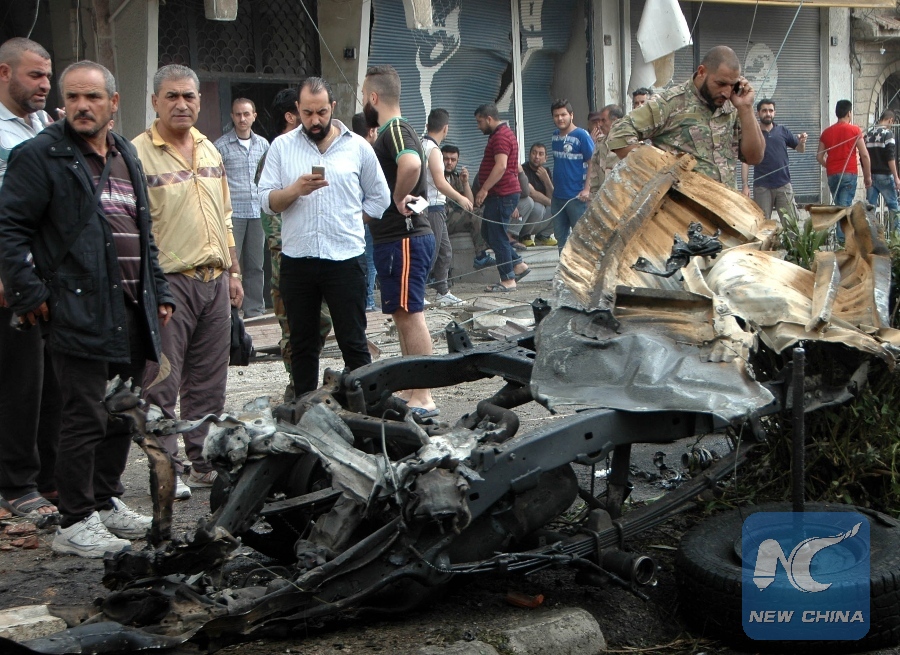File photo shows that people gather at the al-Zahra'a neighborhood in Syria's central city of Homs following a blast on May 23, 2017. (Xinhua/Ammar Safarjalani)
UNITED NATIONS, June 29 (Xinhua) -- The UN under-secretary-general for humanitarian affairs, Stephen O'Brien, on Thursday warned that 13.5 million people in the Middle East country are caught in a protection crisis that threatens their lives on a daily basis.
Briefing the UN Security Council on the humanitarian situation in Syria, O'Brien, also the UN emergency relief coordinator, said that it affects so many because we have seen time and again a complete disregard for the rules of war, subjecting civilians to the horrifying reality of bombs raining down on schools, hospitals and residential areas every day.
Meanwhile, O'Brien also discussed UN efforts to gain access to hard-to-reach areas in Syria but added that, despite our best efforts, we continue to have supplies consistently removed from our trucks before we can even deploy.
Nearly 200,000 treatments have been forcibly removed this year alone. He told the Council that humanitarian workers must be able to deliver based on need.
"Now is the time. Any delay will mean further death. The clock is ticking," he said.
The Syrian conflict, now into its seventh year, has taken a terrible toll on the country's population: hundreds of thousands have been killed, about 6.3 million displaced within the country, and some 5.1 million forced to flee as refugees outside its borders.
The situation is particularly dire in Raqqa, where an offensive was launched to take the city from the Islamic State in Iraq and the Levant (ISIL/Da'esh), and in the last days fully encircled it.
According to the Office of the UN High Commissioner for Human Rights (OHCHR), at least 173 people have been reportedly killed in air and ground strikes. Although about 25,000 have reportedly fled the city since the latest phase of operations, as many as 100,000 civilians could still be trapped there, said O'Brien.
On relief operations in Syria, O'Brien said that the work of humanitarians remains extremely difficult and bureaucratic restrictions on top of attacks and removal of relief supplies has made their operating space incredibly complex and complicated.
Bureaucratic restrictions, he said, delay convoys and often force them to abort their missions or turn around, leaving relief workers vulnerable to attacks.
In one such incident, a driver of a truck was hit by sniper fire from unknown gunmen after his convoy had to turn back to avoid travelling at night. The convoy had been stopped for several hours at a Government checkpoint. A bullet also grazed a second driver.
The injured driver survived and is in stable condition, he said.
"I condemn such acts in the strongest terms, and call for accountability for those responsible," he said. "Those who deliberately direct attacks against humanitarian workers are committing war crimes."
Turning to the besieged locations across the war-torn country, the UN relief chief informed the 15-nation Security Council that the town of Madaya (in rural Damascus) and the Al-Wa'er district in Homs are being removed from the "besieged" list following improvement in access, reducing the number of besieged places to 11.
However, over half a million people still remain at these locations, "trapped and desperate for assistance," the senior UN official said.
Collectively, about 4.5 million Syrians are estimated to remain in the besieged and hard-to-reach areas across the country. Meanwhile, he also updated the Security Council of recent deployments of trucks from the UN World Food Programme (WFP) from Aleppo, through Menbij and to Qamishly in Hassakeh governorate, allowing delivery of aid at scale to north-east Syria, where people had been short of supplies since the closure of a cross-border access point with Turkey in December 2015.
"This is particularly important with growing needs in the north-east Syria due to anti-ISIL operations in the area," he said.
This route is also much cheaper than relief air drops from Damascus, resulting in savings that are equivalent to providing food aid for 100,000 people for one year.
O'Brien said that he looked forward to next week's meeting in Astana, the capital of Kazakhstan, on de-escalation and hopes that it would bring a sustained reduction of fighting, and along with that improved and unhindered humanitarian access.
"I repeat my call for this Council to act now to protect civilians," he said while also calling on the parties to the conflict and those with influence over them to prioritize protection of civilians. "These are legal obligations under the laws of war, and they cannot be bent, broken or avoided."


